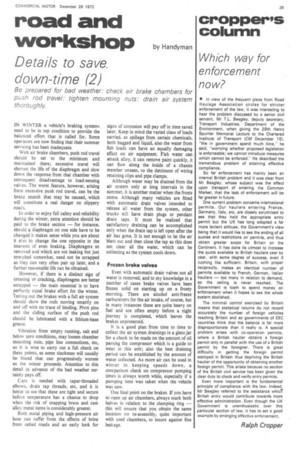cropper's column
Page 31

If you've noticed an error in this article please click here to report it so we can fix it.
Which way for enforcement now?
• In view of the frequent pleas from Road Haulage Association circles for stricter enforcement of the law, it was interesting to hear the problem discussed by a senior civil servant, Mr T.L. Beagley, deputy secretary, Transport Industries, Department of the Environment, when giving the 28th Henry Spurrier Memorial Lecture to the Chartered Institute of Transport (CM December 151. "We in government spend much time," he said, "worrying whether proposed legislation is enforceable; we cannot introduce measures which cannot be enforced." He described the tremendous problem of attaining effective compliance.
So far enforcement has mainly been an internal British problem and it was clear from Mr Beagley, whose subject was the effect upon transport 'of entering the Common Market, that the task of enforcement will be far greater in future.
One current problem concerns international permits, Our hauliers entering France, Germany, Italy, etc, are closely scrutinized to see that they hold the appropriate entry permit but the UK has long adopted a far more lenient attitude, the Government's view being that it would like to see the ending of all quotas and restrictions on permits, and thus obtain greater scope for Britain on the Continent. It has done its utmost to increase the quota available to British hauliers year by year, with some degree of success, even if nothing Nice sufficient. Britain, with proper reciprocity, makes an identical number of permits available to French, German, Italian hauliers — too many in relation to demand, so the ceiling is never reached. The Government is loath to spend money on enforcement when it hopes to see the whole system abolished.
The minimal control exercised by Britain means that statistical returns do not record accurately the number of foreign vehicles reaching Britain and so governments of EEC countries think that the balance is far more disproportionate than it really is. A special problem arises with co-operation permits, where a British haulier obtains a foreign permit only in parallel with the use of a British permit by the foreigner. There is great difficulty in getting the foreign permit stamped in Britain thus depriving the British haulier of the opportunity of obtaining another foreign permit. This arises because no section of the British civil service has been given the clear duty to check and verify entry permits.
Even more important is the fundamental principle of compliance with the law. Indeed, Mr Beagley referred to the assistance whicg British entry would contribute towards more effective administration. Even though the UK Government is unenthusiastic over this particular section of law, it has to set a good example by arranging effective enforcement.
Ralph Cropper












































































